DAVAO CITY (MindaNews / 17 Aug) – Amid the outbreak of the H5 strain of avian influenza in San Luis, Pampanga in Central Luzon, a poultry grower in Davao Region, the sixth largest producer of chicken meat in the country and the second in Mindanao, assured that there is “no need to panic” because Visayas and Mindanao remain free from the infection.
 Transporting chicken in rural Mindanao. MindaNews file photo by BOBBY TIMONERA
Transporting chicken in rural Mindanao. MindaNews file photo by BOBBY TIMONERA
Businessman Edward So, a hog and poultry raiser, said Mindanao is very far from Luzon and commended the efforts of the Department of Agriculture (DA) for taking immediate measures to contain the infection in Pampanga and halt the movement of live poultry and poultry products from Luzon to other parts of the country.
So is also president of the Davao Hogs Raisers Association.
“For me, let’s see what will happen. I hope it will not create too much panic. The prices of chicken and eggs in Luzon are going down because of the issue. But the government is doing its job and we are also monitoring it. So far, we remain infection-free. That’s the assurance we can give for now,” he said.
In a text message on Wednesday, Dr. Dannie Apelo, spokesperson on the avian flu for the Department of Agriculture in the Davao Region (DA 11), said that the Interagency group Avian Influenza Protection Program Task Force Probinsya will inspect commercial and backyard poultry farms in the region following the Pampanga outbreak.
He said that the group has lined up a series of surveillance and monitoring activities on August 23 and 29 and September 4 in all chicken, game fowl and duck farms in the region.
The inter-agency task force is composed of representatives from the DA, Department of Health, Department of Agriculture, Philippine National Police, and local government units.
Apelo said they would collect blood and oropharyngeal swab samples for testing at the Davao Regional Animal Diagnostic Laboratory. All birds will be exterminated within 1-km radius from the area of infection, he added.
Apelo said all game fowls coming from Luzon will be temporarily banned from entering Mindanao.
In a DA memorandum circular dated August 14, a temporary ban has been imposed on shipment of live domestic and wild birds and their products, including poultry meat, day-old chicks, eggs, semen, manure from Luzon to Visayas and Mindanao “to prevent further spread of the disease in other parts of Luzon and Visayas and Mindanao.”
But shipment to Luzon from Visayas and Mindanao, being bird flu-free, will be allowed.
For areas within Luzon, transport may be allowed but it shall be accompanied by a shipping permit and a Veterinary Health Certificate issued by a government sector veterinarian certifying that these products were sourced from farms with no incidence of avian influenza for the past 21 days prior to shipment.
For poultry meat, it said the temporary ban will be lifted when there are no new cases reported 90 days after stamping out activity, including disinfection of all affected areas and surveillance.
So said they are expecting Luzon poultry growers would buy their source of chicken and eggs from Mindanao due to the incident.
The chicken production of Mindanao and Visayas combined was only 555,534 metric tons, or 33 percent of the country’s total production of 1,674,505 MT and twice lesser compared to the production of Luzon at 1,118.971 MT, a 2016 report of the Philippine Statistics Authority (PSA) showed.
Mindanao’s production was at 323,663 MT while Visayas’s was 231,871 MT.
Central Luzon, the region of the bird flu-stricken province of Pampanga, produced the highest yield with 590,993 MT.
Central Luzon was followed by Calabarzon, 328,430MT; Northern Mindanao, 152,801 MT; Central Visayas, 84,376 MT; Ilocos Region, 78,760 MT; Western Visayas, 64,103 MT; Cagayan Valley, 60,644 MT; Soccsksargen, 48,844 MT; Negros Island, 47,098 MT; Bicol Region, 42,241 MT; Eastern Visayas, 36,294 MT; Zamboanga Peninsula, 30,204MT; Caraga, 13,864 MT; Cordillera Administrative Region (CAR), 7,602MT; and Autonomous Region in Muslim Mindanao (ARMM), 4,943 MT.
So said they already advised their members to up the ante in biosecurity measures to protect their farms.
“The good thing is the DA immediately contained it. But we cannot also let our guards down and we have to do our part to increase biosecurity measures here,” he said. (Antonio L. Colina IV / MindaNews)
